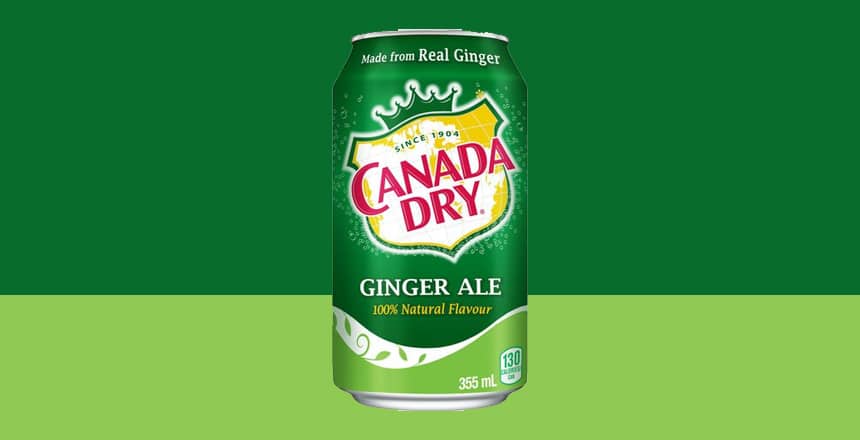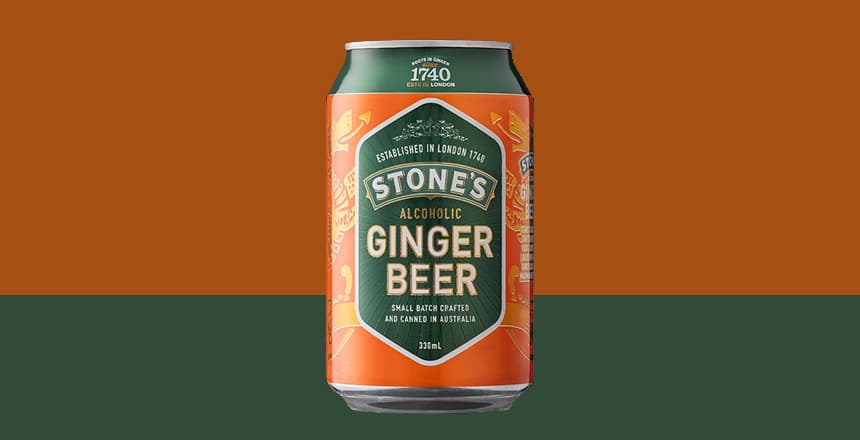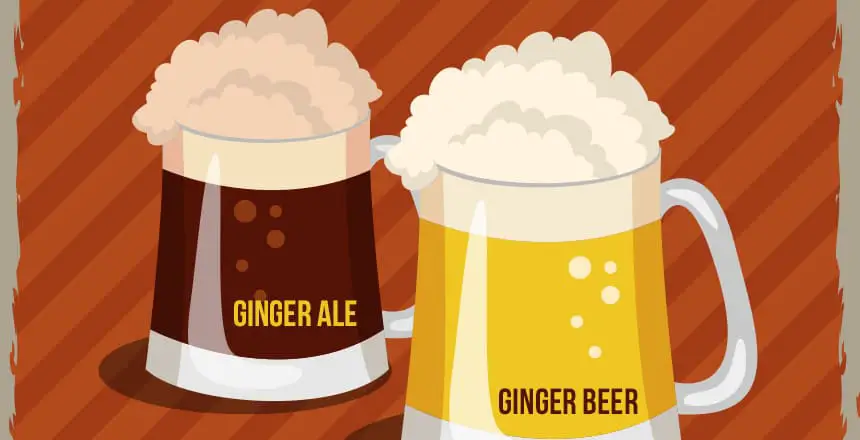If you’re keen on ginger-flavored drinks, you’ve likely sampled both ginger ale and ginger beer. Both beverages offer just enough of the spicy kick that has become so popular in modern times – but have you ever found out what is the difference between ginger ale and ginger beer?
Although they sound like they could be similar, there are actually quite differences between ginger ale and ginger beer from production and brewing storage to flavor and alcohol content.
So if you’re looking for more knowledge on this subject, read on to dive into exactly all the differences between ginger ale and ginger beer.
Related:
- What Does Beer Taste Like
- What Temperature Does Beer Freeze
- What Is Root Beer Made Of
- How Much Alcohol Is In Beer
Contents
What is Ginger Ale?

Ginger ale is a non-alcoholic drink made from ginger, sugar, and carbonated water that originated in Ireland. It has a light ginger flavor that is slightly sweet with notes of lemon and lime. The taste is typically milder than ginger beer but still contains some spice.
Ginger ale is often used to aid with digestive issues, and reduce nausea and headaches.
What is Ginger Beer?

Ginger beer refers to the original type of ginger beer that originated in England. It was typically made by brewing and fermenting a mixture of ginger, sugar, water, and lemon with a starter culture known as the “ginger beer plant”.
The result is a slightly carbonated, strongly flavored alcoholic beverage. It has a sweet and spicy taste with light notes of ginger and lemon.
The Difference Between Ginger Ale and Ginger Beer
Now, you have all the basic information about Ginger Ale and Ginger Beer, so can you point out what is the difference between ginger ale and ginger beer? Of course, Ginger ale and ginger beer differ in production, flavor, alcohol content, and brewing storage.
Production
Ginger ale is made by carbonating water and adding sugar, flavors, and preservatives to it. This process makes for a sweeter beverage that is not fermented.
On the other hand, ginger beer is brewed with yeast and sometimes additional sugars which results in a slightly alcoholic beverage after fermentation. The fermentation process also creates a unique flavor profile that is more intense than ginger ale.
Flavor
Ginger ale is typically sweet and has a mild ginger flavor. The carbonation and sweetness make it a refreshing choice for those looking for a beverage with less of an intense ginger taste.
On the other hand, ginger beer has a much more intense ginger flavor due to the fermentation process. It also tends to be slightly spicier compared to ginger ale.
Alcohol Content
Ginger ale is generally non-alcoholic, containing less than 0.5% ABV (alcohol by volume). This makes it a great choice for those who do not wish to consume alcohol or are underage.
On the other hand, ginger beer has an alcohol content of up to 4% ABV due to the fermentation process. This makes it an unsuitable choice for those who cannot consume alcohol or are underage.
Brewing Storage
Ginger ale does not require any special brewing, storage, or aging procedures because of its low-alcohol content and non-fermented nature. It only needs to be refrigerated before drinking.
In other ways, ginger beer needs to be brewed and aged before it can be consumed. It also requires proper storage in a cool, dark place to ensure its quality.
What is The Reason For Brewing Ginger Beer?
Ginger beer is traditionally brewed to create a unique flavor profile and an alcoholic beverage. The fermentation process also creates a slightly spicy and more intense taste than ginger ale.
Additionally, the brewing of ginger beer allows for more control over ingredients such as sweetness, spiciness, and alcohol content. This makes it ideal for those looking for particular qualities in their ginger beer.
Popular Ginger Ale Cocktails
Ginger ale is often used in cocktails. Some of the most popular ginger ale cocktails include the Moscow Mule, Dark and Stormy, Gin Gin Mule, and Rum & Ginger Ale.
These drinks are typically served with lime or lemon slices for garnish, as well as other additions like mint leaves or bitters.
FAQs
Can I Substitute Ginger Beer For Ginger Ale?
Ginger beer can usually be substituted for ginger ale in most cocktails and recipes, but the stronger, spicier flavor and higher carbonation level of ginger beer can alter the overall taste and texture.
Does Ginger Beer and Ginger Ale Taste The Same?
No, ginger beer and ginger ale have different flavor profiles. Ginger ale tends to be slightly sweeter while ginger beer is spicier and more carbonated.
Which is Better For You Ginger Beer or Ginger Ale?
Both ginger beer and ginger ale can be beneficial for your health if they are made with natural ingredients and limited added sugar. Ginger has anti-inflammatory and antioxidant properties that can aid digestion, lessen inflammation, and improve the immune system.
Is Ginger Beer Good For Your Stomach?
Yes, ginger beer can be good for your stomach. Ginger stimulates the production of digestive juices and enzymes, which can help the body break down food more effectively and improve overall digestion.
Is Moscow Mule Ginger Ale or Beer?
Moscow Mule is traditionally made with ginger beer, not ginger ale. Ginger beer has a stronger flavor and is more carbonated than ginger ale, which is why it is preferred for this cocktail.
Why is It Called Ginger Beer If There Is No Alcohol?
The term “ginger beer” can be a bit misleading because it doesn’t always contain alcohol. The name likely comes from the fact that ginger beer was originally brewed as a fermented beverage with the use of yeast, just like beer.
Final Thought
Ginger beer and ginger ale are both refreshing drinks that can be used to make delicious cocktails. While they have some similarities, their production and flavor make them distinct from one another.
For those who prefer a sweeter flavor, ginger ale is the better option. For those looking for a spicier flavor or higher carbonation level in their drinks, ginger beer is the best choice.
So whether you opt for the smooth taste of a refreshing ginger ale or the fiery kick of a warming ginger beer, keep in mind that each drink disappears quickly yet yields long-lasting benefits!
